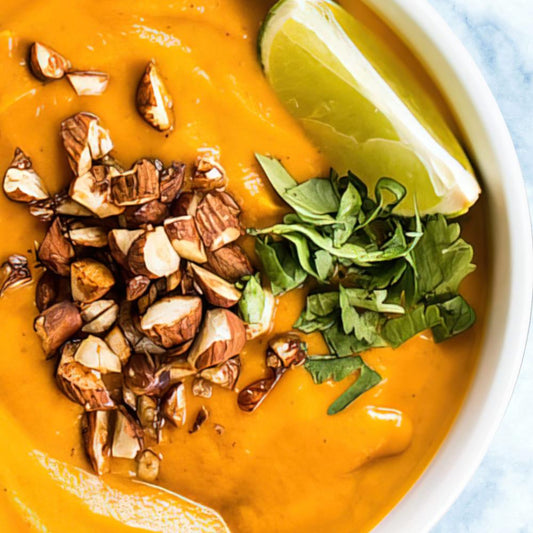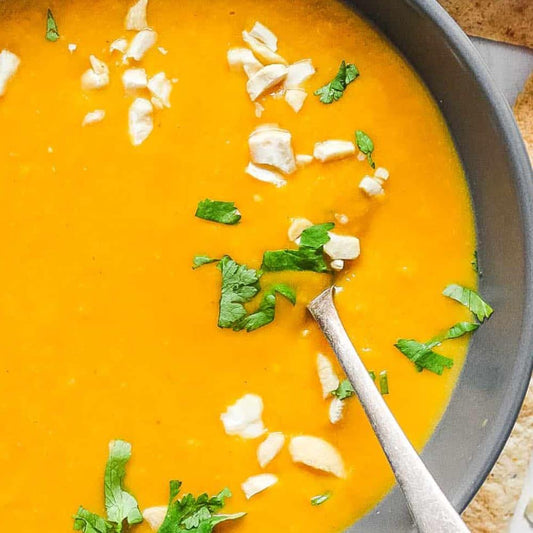Pumpkin always seems to get all the attention when it comes to seasonal squashes, but butternut squash is deserving of some of the spotlights. The seeds of butternut squash are packed with the advantages of this vegetable, which include more potassium than a banana as well as compounds that fight cancer.
First thing first, and this is going to blow your mind: butternut squash is a fruit. Because it is often prepared in dishes in the same manner as a vegetable would be (for example, by roasting, sautéing, or puréeing), we will refer to it as a "vegetable" from this point on for the sake of convenience.
Butternut squash is a type of winter squash, which places it in the same category as other oddly shaped edibles indigenous to South and Central America, such as spaghetti squash, acorn squash, and pumpkin, all of which are grown during the summer despite having the label "winter" in their names. They are referred known as "winter squash" because they reach maturity during the winter months, at which point their skin transforms into a brittle rind, and they can be preserved for the duration of the winter season.

Butternut Squash is Rich in Nutrients and Low in Calories
Butternut squash is a type of winter squash with orange flesh that is prized for its adaptability as well as its sweet and nutty flavor.
Although it is possible to consume butternut squash in its raw form, most people choose to roast or bake it instead.
One cup of cooked butternut squash weighs 205 grams and delivers the following nutrients:
Calories: 82 Carbs: 22 grams
Protein: 2 grams
Fiber: 7 grams
457 percent of the Recommended Daily Allowance for Vitamin A (RDI)
Vitamin C accounted for 52% of the RDI
Vitamin E comprises 13% of the RDI
10% of the RDI for Thiamine (B1) and Niacin (B3)
13% of the RDI for Pyridoxine (B6) and 10% of the RDI for Folate (B9)
Magnesium: 15% of the RDI

Potassium: 17% of the RDI
The RDI for manganese is 18%.
As you can see, despite its low-calorie content, butternut squash is packed with a variety of essential nutrients.
In addition to the vitamins and minerals that have already been mentioned, it is also an excellent source of the minerals calcium, iron, phosphorus, and copper.
Health Benefits of Butternut Squash
Butternut squash is a type of winter squash with orange flesh that is prized for its adaptability as well as its sweet and nutty flavor.
It may be utilized in a variety of culinary applications and is an excellent complement to a wide variety of both sweet and savory dishes.
Not only is butternut squash delicious, but it is also an excellent source of nutrients such as vitamins, minerals, fiber, and antioxidants.
Because of its high concentration of antioxidants, butternut squash may reduce the likelihood of contracting certain diseases.
The antioxidant powerhouses vitamin C, vitamin E, and beta-carotene can all be found in generous quantities in butternut squash.
Antioxidants help prevent or delay cell damage and reduce inflammation, both of which may lower your risk of various chronic diseases. Antioxidants help prevent or slow cellular damage.

Butternut Squash Promotes Healthy Digestion
Butternut squash is an excellent source of dietary fiber, which means that it can help improve digestion and alleviate digestive issues like constipation and bloating. The fiber in the diet can make stools bulkier and drive peristaltic action, all while reducing the likelihood that inflammation will develop in the colon. Additionally, fiber can assist in the removal of excess cholesterol from the body, hence preserving healthy cardiovascular function.
Butternut Squash Helps Improves Bone Density
As is the case with most gourds, butternut squash is loaded with a variety of essential minerals, including potassium, manganese, magnesium, and calcium, all of which contribute to the health of your bones and their ability to withstand wear and tear. It is essential to incorporate mineral-rich vegetables, such as gourds and squash, into your diet as you get older to combat the natural consequences of aging and the beginning stages of osteoporosis.

Butternut Squash Helps Prevent Loss of Vision
Vitamin A is necessary for the body to have to keep normal vision functioning properly.
Beta carotene is a form of vitamin A that is particularly vital for maintaining healthy eyes. Butternut squash is an excellent source of this nutrient.
Studies have suggested that taking foods or supplements containing beta carotene may help prevent age-related macular degeneration, a form of vision loss that is more frequent as individuals become older.
Additionally, butternut squash has a high concentration of vitamin C, a trace amount of vitamin E, and a trace quantity of zinc. There was a 35% reduction in the risk of age-related macular degeneration among those who had an intake of vitamins C and E, beta-carotene, and zinc that was above the average.
Butternut Squash Helps Maintain Healthy Skin
One cup of butternut squash provides up to 34% of the daily value for vitamin C, making it a good choice for those looking to get their vitamin C fix. Collagen, the primary protein found in your skin, cannot be produced without enough amounts of vitamin C. In addition to this, it helps provide antioxidant protection against the photodamage caused by ultraviolet light.

Applying vitamin C directly to the skin might occasionally be beneficial. The authors of one study observed that healthy skin is favorably connected with the consumption of fruit and vegetables in many studies that were carried out very effectively. Vitamin C availability may be a factor, although the active component in the fruit and vegetables that are responsible for the observed benefit cannot be identified.
Butternut Squash May Help Decrease the Risk of Developing Certain Cancers
There is some evidence that the vitamin A included in butternut squash can help protect against the development of certain malignancies. The vitamin has a crucial role in controlling the process of cell differentiation and growth. Several studies have investigated the potential link between a diet rich in beta-carotene and a reduced threat of developing lung and prostate cancers.

For instance, research on the connection between smoking and an increased risk of lung cancer due to beta-carotene has produced conflicting findings. In addition, there is some speculation that a larger consumption of vitamin A may be associated with a reduced risk of prostate cancer. On the other hand, the link between vitamin A consumption and the risk of developing cancer are not well understood, and there is a chance that consuming an excessive amount of vitamin A could be harmful.
How to Select & Buy Butternut Squash
The butternut squash harvest coincides with fall. The months of September and October in the United States are ideal for making purchases of ripe, locally grown squash. It is possible to purchase it throughout the year as an import at various other times. Keep an eye out for butternut squash that has a uniform beige color and is free of any deep cuts or bruises. Scratching on the surface in very small amounts is normal. Choose a squash that has a dense and meaty texture despite its small size. Steer clear of squash that has brown spots or punctures, as these can introduce bacteria and mold into the food.

How to Store Butternut Squash
You can store your squash for up to a month in a cold, dark location like a pantry as long as you do so. The undercooked squash should not be refrigerated. On the other hand, if you peel or prepare the butternut squash, it needs to be stored in the refrigerator and will remain edible for somewhere between five and seven days.
After the skin has been removed, butternut squash that has been peeled can be frozen. Simply cut the raw squash into cubes or slices, then pack them in airtight freezer bags for storage for up to a year. You may also freeze squash once it has been cooked.

You can also consume it in its raw form; however, heating the squash tenderizes the meat, which makes it much simpler to consume and digest. When cooked, squash absorbs many various flavors, making it taste even better than it did before. Some people are curious about whether or if they can also consume the skin of the squash; nevertheless, it is strongly recommended that this not be done because the skin is tough and unpleasant.
How to Prepare Butternut Squash
Roasting, baking, pureeing, or sautéing are all valid preparation methods for butternut squash. You can also mash it or simmer it before adding it to soups, stews, or chili. Alternatively, you may load squash with nutritious grains or legumes for a vegetarian dinner choice that is high in both nutrients and protein.
Because peeling butternut squash can be a challenge, many people choose to prepare the vegetable with the skin still on during the cooking process. After doing this, the meat of the squash will separate from the skin more easily.
Baking butternut squash with some unsaturated fat, like grapeseed or canola oil (both of which have higher smoke points compared to other alternatives), might increase the amount of vitamin A that is absorbed by the body. The natural sugar in butternut squash can be caramelized using this method of roasting, which results in an improvement in flavor.




